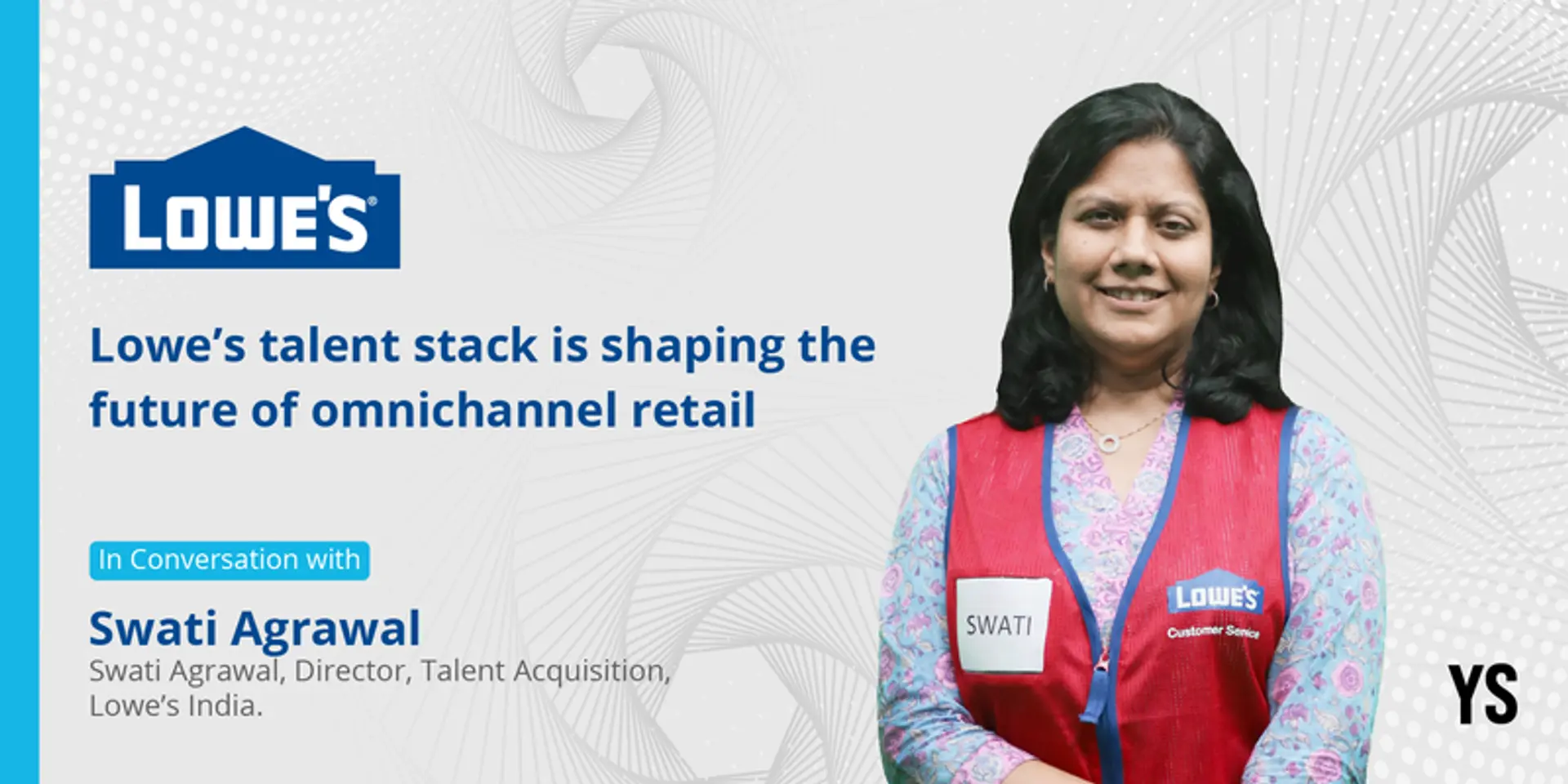
Lowe’s India
View Brand PublisherLowe’s talent stack is shaping the future of omnichannel retail
Swati Agrawal, Director for Talent Acquisition & HR Strategy at Lowe’s India, speaks about the evolving roles of Global Capability Centres (GCC) and how Lowe’s is making a difference with its hiring choices.
With a career spanning two decades, Swati Agrawal has closely seen the talent landscape change and evolve due to varied factors such as the pandemic, technological advancements, and more.
Agrawal started her career with an executive search firm based out of Zurich where she stayed for 13 years, followed by a stint in Myntra where she led multiple HR functions including the talent acquisition function. She joined Lowe’s three years ago and currently leads the talent acquisition and HR strategy functions.
In a freewheeling chat with YourStory, the Director for Talent Acquisition & HR Strategy at Lowe’s India sheds light on the changing roles of Global Capability Centres (GCC), the need for diversity, and how Lowe’s is making a difference with its hiring choices.
Edited excerpts from the interview:
YourStory (YS): How has the hiring landscape changed in the past decade?
Swati Agrawal (SA): Talent acquisition used to be perceived as a function that sources CVs but it has undergone a massive change in the last few years. The function has emerged as a strategic business partner, and a couple of things have happened to aid that. Firstly, talent is being viewed very differently right now, and as a talent acquisition partner, you're expected not only to work closely with the business in terms of hiring needs but also to bring a lot of talent insights. You're ultimately looked at as somebody who's going to help solutions for business needs, which transcend across multiple HR functions - how the role fits within the organisation, understanding the availability of internal talent, etc.
Secondly, technology and automation are playing a massive role in the process. It has allowed the talent acquisition function to move away from transactional tasks to a function that not only collaborates across multiple HR functions but also provides insights from a talent market perspective. For instance, the new generation of talent is not driven by compensation alone - many things come into play, including meaningful work, the ability to create impact, and the work-life balance they're seeking. A lot of this has to be taken into consideration by the talent acquisition team as they're engaging and drawing the talent acquisition strategy.
YS: Global Capability Centres (GCC) have evolved beyond R&D and backend operations. As innovation hubs, they are now adding both topline and bottom line value. How has the role of talent evolved with this change?
SA: In the last few years, there has been a shift in the role that GCCs play – from just lights-on work to strategic partners. We've witnessed this very closely through the evolution of Lowe's India. During our initial years, the focus was more around supporting the headquarters. Since 2020, our focus has increasingly been on value generation and impacting the end customer through omnichannel retail innovation. Besides, the organsiation-wide digital transformation, some of the most critical functions impacting customers such as search, personalisation, order management system etc., are led out of India. We have also expanded our capabilities to go way beyond technology, into multiple functions such as supply chain, merchandising, data analytics, marketing, finance, and so on.
Business expectations have changed. The work our associates are doing is impacting both the topline and bottom line of our business revenue and in this shift towards driving business value, there’s a need to look at talent very differently. You need to build a diverse talent pool that can not only steer business growth, but also frontend the shaping of an entire industry. The quality of talent, the culture and the mindset needed for this needs to be built ground-up.
YS: ManGroup’s report of Talent Shortage 2023 noted that 80% companies in India report shortage of skilled talent. With the skills gap being a real issue, how is Lowe’s bridging the gap? What distinct advantages does an employee get access to at Lowe’s?
SA: We have diverse learning programmes for our associates across all levels, in line with our core behaviour of “continue learning”. These programmes are designed with business needs in mind to ensure our associates excel in their current roles and to upskill for career progression. For instance, given the challenging talent market for engineers, we have two programmes focused on engineers. Firstly, “Developing Engineering Women’s Careers (DEW)” aims to create learning opportunities for women engineers, and ACE focuses on preparing engineers to take on more senior positions, such as “principal engineers”. We also have many self-paced learning modules across functions beyond engineering. These could be merchandising, HR, retail, marketing, and so on and so forth. Additionally, programmes such as “Elevate Your Influence” are focused on the career progress of high-potential women talent.
A significant proportion of our associates joined us through campuses - a pool of talent where we invest a lot through tailored programmes to train and ease their move from campus to corporate. Campus is also a key source of hiring diverse talent - in fact more than 50% of all campus hires last year were women. From a leadership standpoint, we have programmes such as Executive Edge designed for senior leaders. Lastly, and most importantly, we have an eye on internal movements and are making proactive efforts to increase them through campaigns like “Own Your Career”. We have consciously established a hiring strategy focusing more on internally building talent.
YS: As per Genpact Centre for Women’s Leadership, about 50% of working women in India leave their jobs to care for their children by age 30. These numbers highlight the importance of returnship programmes. How are you bringing women back to work?
SA: At Lowe’s, we address the issue in several different ways. Firstly, we ensure our expecting mothers have a safe and inclusive environment to thrive. Our ‘Bring Her Back’ programme is designed to support mothers through pre-maternity, maternity, and reintegration into the organisation. This year, we revamped the programme with added resources and benefits, and 100% of expecting associates have returned from maternity leave.
Secondly, we have built a platform to welcome women professionals on a career break to join Lowe’s India. Our “Do-It-Herself (DIH)” programme, now in its fourth year, aims to create an ecosystem that enables women on a career break to resume their careers through an internship opportunity, followed by mentoring, career reintegration, and an opportunity to join us full-time. So far, we have given this opportunity to more than 60 women looking to restart their careers.
Last but not least, we ensure our workplace offers the right benefits to returning women, such as a creche facility, a robust medical insurance programme, transport, a flexible work model, etc., to enable them to thrive in the workforce.
YS: What is the hiring process at Lowe’s? How do you ensure that there isn’t any unconscious bias?
SA: At Lowe’s, we constantly innovate and undertake value-driven work. Therefore, it is important for us to establish a very strong value proposition within our talent pool that can see us as a great place to work. At every touchpoint, we ensure our candidates get a uniform experience. We believe in keeping our hiring channels diverse and explore various ways to identify and engage good talent – including external meetups, industry events, paid partnerships with media, etc. In fact, social media has become a very important sourcing channel, influencing around 50% of hires.
We have a very structured interview process that focuses on functional competencies and our core behaviours. We invest heavily to ensure that interviewers are well-equipped with tools to assess candidates. We also have a structured feedback mechanism that helps us make objective decisions. As an organisation, we give a lot of importance to what our candidates and hiring managers feel about our hiring process. We seek input from both these key stakeholders at the end of each process.
Last year, we introduced “Behavioural Event Interviewing (BEI)” skills training to all associates who interview candidates. We undertook this fresh approach to explore more science-based techniques for selecting the right candidates and eliminating bias.
YS: What is your hiring strategy for a company as large as Lowe’s?
SA: India has a very diverse talent pool for varied streams, and organisations that can leverage this talent availability can really build a great foundation. GCCs have emerged as key employers and realise the potential of India’s talent. At Lowe's India, we continue to grow our capabilities as we drive some of the core retail innovations from here. We are always looking for talent that is not only functionally strong but also lives our core values and behaviours. We focus on bringing in people who are obsessed with customers, who want to make things better, and who want to challenge the status quo: those who are action-oriented and deliver results, and those who show courage. Beyond functional skills, these behaviours are very critical to us.
Lowe’s India will continue to play a strategic role in Lowe’s Inc. ’s growth. We are continuously seeking talent across multiple functions, including technology and business areas like merchandising, marketing, and supply chain.
Lowe’s is ranked among India’s Top 100 Best Workplaces by Great Place to Work. To grow at Lowe’s India, click here.







